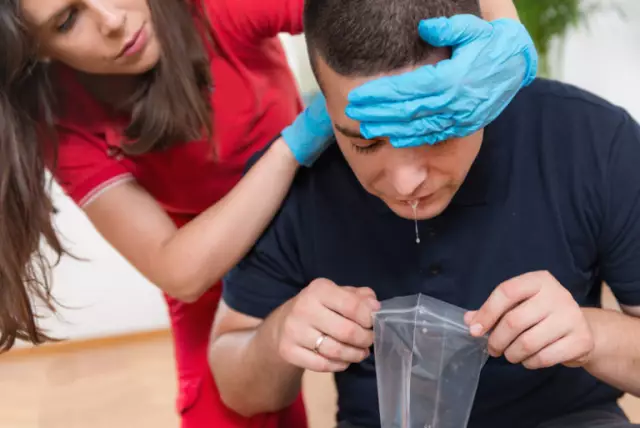- Author Rachel Wainwright wainwright@abchealthonline.com.
- Public 2023-12-15 07:39.
- Last modified 2025-11-02 20:14.
Antifreeze poisoning
Antifreeze is a liquid with a low freezing point intended for cooling internal combustion engines of cars. It is a mixture of water and ethylene glycol.

Source: depositphotos.com
How does antifreeze poisoning occur?
Antifreeze poisoning develops when consumed internally. More often this happens by accident (antifreeze is mistaken for ethyl alcohol), but there is also a deliberate use for the purpose of suicide.
Ethylene glycol contained in antifreeze has a predominantly toxic effect on the endothelium (inner lining) of blood vessels and tissues of the central nervous system. In this regard, it belongs to the group of neurovascular poisons.
Once inside the body, ethylene glycol undergoes oxidation. As a result, toxic metabolites are formed: oxalic and glycolic acid. They are excreted through the kidneys, causing severe kidney damage.
Poisoning symptoms
Symptoms of antifreeze poisoning appear several hours after ingestion. Depending on the dose of the poison taken, intoxication can proceed in severe, moderate and mild forms.
In the clinical picture, the cerebral and hepatorenal (hepatic-renal) phases are distinguished.
Brain phase
Symptoms of the cerebral phase are due to the direct effect of the components of antifreeze on the tissues of the nervous system and their provision of paralytic, narcotic and exciting effects. These include:
- the growing state of intoxication;
- redness of the skin and mucous membranes, later replaced by cyanosis;
- excessive talkativeness, psycho-emotional excitement, fussiness, euphoria, alternating with depressed mood, and then drowsiness;
- ataxic gait;
- muscle weakness;
- stiff neck;
- pain in the lower back and abdomen;
- vomiting;
- tremor of the limbs;
- convulsions.
As the intoxication grows, consciousness darkens more and more, the victim falls into a coma. In severe poisoning, areflexia develops, uncontrolled urination and defecation may occur. Blood pressure is within normal limits, tachycardia is replaced by bradycardia. The pupils are dilated and do not respond well to light. Breathing is rare, noisy and deep.
The brain phase of antifreeze poisoning lasts up to two days, then death occurs, or the condition gradually improves. But even if the condition has improved significantly, it is premature to talk about recovery, since after a while the hepatorenal phase of poisoning develops.
Hepatorenal phase
Symptoms of the hepatorenal phase appear 3-20 days after poisoning, they are associated with the toxic effects of antifreeze oxidation products (especially oxalic acid) on kidney tissue. These include:
- a sharp decrease in the amount of urine separated, up to anuria;
- a strong feeling of thirst;
- arterial hypertension;
- diarrhea and abdominal pain associated with uremic colitis;
- pain in the right hypochondrium;
- enlarged liver;
- sharply positive symptom of Pasternatsky;
- an increase in the concentration of urea, creatinine and medium molecules in the blood;
- albuminuria;
- metabolic acidosis.

Source: depositphotos.com
First aid for antifreeze poisoning
If the victim is conscious, first aid for antifreeze poisoning should begin with gastric lavage. To do this, you should drink about 1 liter of a 2% sodium bicarbonate solution (dissolve 4 teaspoons of baking soda in 1 liter of warm water), then induce vomiting by pressing on the root of the tongue.
To bind poisonous substances that have entered the small intestine, take Smecta, Activated carbon or any other enterosorbent.
When is medical attention needed?
Antifreeze is highly toxic, its use inside is life threatening, therefore, in all cases of poisoning, they need medical attention. If you suspect antifreeze poisoning, you should immediately call an ambulance or take the victim to the toxicology department on your own.
Inpatient treatment begins with exchange blood transfusions. For the purpose of detoxification, infusion of saline solutions, glucose, sodium bicarbonate is carried out. Diuretics and vitamin preparations are prescribed. According to indications, respiratory analeptics, cardiovascular and anticonvulsants are used.
To neutralize oxalic acid, magnesium sulfate is administered intravenously.
With the development of hepatorenal syndrome, hemodialysis may be required.
Possible consequences
Severe poisoning with antifreeze usually ends with the death of the patient within the first day. With lighter intoxications, there is a serious impairment of renal excretory function, the rehabilitation of which often takes several months. Sometimes, despite the treatment, the kidney function is never fully restored, and chronic renal failure develops.
Severe antifreeze damage to the brain often causes the development of neurological symptoms that persist for life.
Prevention
To prevent antifreeze poisoning, you must:
- add special components to antifreeze that change its taste and color and / or give it an unpleasant odor;
- to carry out explanatory work about the high toxicity of this substance;
- at enterprises to exercise strict control over the storage and consumption of antifreeze;
- at home, store the poison out of the reach of children.

Elena Minkina Doctor anesthesiologist-resuscitator About the author
Education: graduated from the Tashkent State Medical Institute, specializing in general medicine in 1991. Repeatedly passed refresher courses.
Work experience: anesthesiologist-resuscitator of the city maternity complex, resuscitator of the hemodialysis department.
The information is generalized and provided for informational purposes only. At the first sign of illness, see your doctor. Self-medication is hazardous to health!






